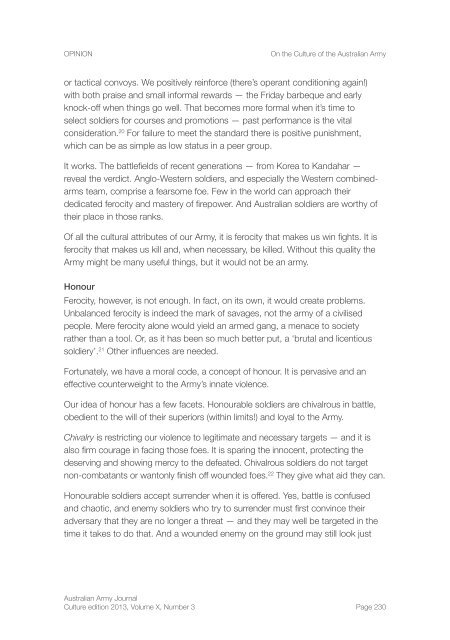Australian Army Journal
Australian Army Journal
Australian Army Journal
Create successful ePaper yourself
Turn your PDF publications into a flip-book with our unique Google optimized e-Paper software.
OPINION<br />
On the Culture of the <strong>Australian</strong> <strong>Army</strong><br />
or tactical convoys. We positively reinforce (there’s operant conditioning again!)<br />
with both praise and small informal rewards — the Friday barbeque and early<br />
knock-off when things go well. That becomes more formal when it’s time to<br />
select soldiers for courses and promotions — past performance is the vital<br />
consideration. 20 For failure to meet the standard there is positive punishment,<br />
which can be as simple as low status in a peer group.<br />
It works. The battlefields of recent generations — from Korea to Kandahar —<br />
reveal the verdict. Anglo-Western soldiers, and especially the Western combinedarms<br />
team, comprise a fearsome foe. Few in the world can approach their<br />
dedicated ferocity and mastery of firepower. And <strong>Australian</strong> soldiers are worthy of<br />
their place in those ranks.<br />
Of all the cultural attributes of our <strong>Army</strong>, it is ferocity that makes us win fights. It is<br />
ferocity that makes us kill and, when necessary, be killed. Without this quality the<br />
<strong>Army</strong> might be many useful things, but it would not be an army.<br />
Honour<br />
Ferocity, however, is not enough. In fact, on its own, it would create problems.<br />
Unbalanced ferocity is indeed the mark of savages, not the army of a civilised<br />
people. Mere ferocity alone would yield an armed gang, a menace to society<br />
rather than a tool. Or, as it has been so much better put, a ‘brutal and licentious<br />
soldiery’. 21 Other influences are needed.<br />
Fortunately, we have a moral code, a concept of honour. It is pervasive and an<br />
effective counterweight to the <strong>Army</strong>’s innate violence.<br />
Our idea of honour has a few facets. Honourable soldiers are chivalrous in battle,<br />
obedient to the will of their superiors (within limits!) and loyal to the <strong>Army</strong>.<br />
Chivalry is restricting our violence to legitimate and necessary targets — and it is<br />
also firm courage in facing those foes. It is sparing the innocent, protecting the<br />
deserving and showing mercy to the defeated. Chivalrous soldiers do not target<br />
non-combatants or wantonly finish off wounded foes. 22 They give what aid they can.<br />
Honourable soldiers accept surrender when it is offered. Yes, battle is confused<br />
and chaotic, and enemy soldiers who try to surrender must first convince their<br />
adversary that they are no longer a threat — and they may well be targeted in the<br />
time it takes to do that. And a wounded enemy on the ground may still look just<br />
<strong>Australian</strong> <strong>Army</strong> <strong>Journal</strong><br />
Culture edition 2013, Volume X, Number 3 Page 230

















